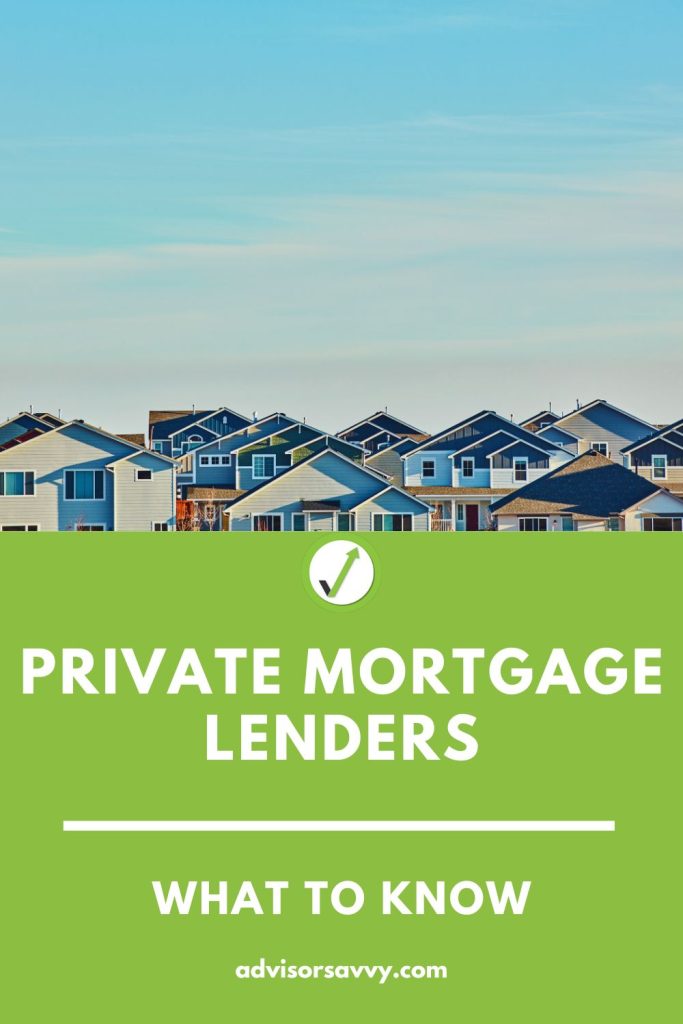
Canada has some of the world’s most expensive real estate. Big bank’s real estate financing options are increasingly harder to qualify for. Plus, with the current prime rate, they’re more expensive than usual. Private mortgage lenders have emerged as a possible alternative. They are also known as non-bank lenders or private money lenders. These lenders provide borrowers and investors with easier access to mortgages. They offer unique advantages including personalized terms and creative financing solutions. This flexibility allows borrowers to navigate “different” financial situations that are not always accepted by banks, such as self-employment, low credit scores, Islamic banking needs, or any other details big banks may shy away from. Private mortgage lenders have become an increasingly attractive option for borrowers.

Table of contents
- What is a private mortgage lender?
- Is a private mortgage better than a bank?
- Is private lending legal in Canada?
- Are private mortgages a good idea?
- What are the cons of private lending?
- Does the mortgage stress test apply to private lenders?
- What are private lender rates on mortgages?
- Do you need a down payment for a private mortgage?
- Are private mortgages insured?
- How to find a private mortgage lender
- Can I get a mortgage from a private lender?
Private mortgage lenders make quick lending decisions. This is different from the slow, bureaucratic nature of banks. Meaning, private lenders can make speedy loan approvals. Thereby allowing borrowers to capitalize on time-sensitive real estate opportunities. Speed and efficiency are particularly valuable for investors looking to capitalize on a hot market, like Canada’s real estate.
While private mortgage lending offers appealing benefits, there are risks to consider too. It is essential to approach private lending with a clear understanding before moving forward. This includes its terms, risks, and legalities. When navigating private lenders, having all the information maximizes opportunities. Learn more about private mortgage lenders and if it may be right for you with this article.
Related Reading: How Does A Mortgage Work In Canada?
Your credit score & report. Always free, forever
It takes 3 minutes to join 20+ million people who trust ClearScore to help them improve their financial future
What is a private mortgage lender?
A private mortgage lender can be an individual or a company. They offer real estate financing outside of traditional banking. They earn money on interest, just like a bank, but by providing direct loans to borrowers. In addition, they have become popular in recent years. They offer flexibility and customized terms that suit individual needs. Private mortgage lenders get money to people who may not qualify for traditional loans.
Private mortgage lenders make eligibility decisions quickly without the bureaucratic structure seen in banks. This allows borrowers to secure properties swiftly, without missing bargains. These loans are typically collateral-based, using the property itself as security, which is how this is possible. However, private mortgage loans normally come with higher interest rates. Private lending comes with the increased risk taken by these lenders. Most borrowers have unconventional financial situations or lower credit scores.
Related Reading: What is a REIT?
How does private mortgage lending work?
Private mortgage lending is a non-traditional avenue for real estate financing. Individuals or private companies outside the conventional banking system provide mortgage loans to those who want them. Borrowers often connect with private lenders through real estate and broker networks, as opposed to public advertising.
This lending process works by using the property being financed as collateral. Private lenders assess its value, the borrower’s equity, and potential repayment capacity. Then, they determine lending terms and amounts, which the borrower is welcome to negotiate. Private mortgage loans typically come with higher interest rates. This is because they are loaning to individuals who have increased risk. Often, borrowers have been turned away by banks for having unconventional financial circumstances.
Once terms are agreed upon, a legal contract outlines details such as repayment terms and interest rates. Both borrowers and lenders must approach this arrangement transparently. Ultimately, the process looks very similar to applying for a mortgage with a bank. However, there is more emphasis on the borrower’s need to do due diligence and research.
Why do people get private mortgages?
People choose private mortgages for a variety of reasons. Here are common reasons why people choose to get a private mortgage:
- Individuals with lower credit scores can easily access private mortgage lenders.
- Investors who like to move fast or acquire multiple properties may use private mortgage lenders.
- People looking to buy unique properties, such as barns, non-functional farms, or warehouses.
- Self-employed individuals, who may have irregular or seasonal income.
- People looking to negotiate personalized agreements.
- Borrowers seeking to refinance existing mortgages or access equity in their properties.
Related Reading: How To Finance A Home Renovation
Is a private mortgage better than a bank?
Deciding between a private mortgage and a mortgage from a bank depends on individual circumstances. Both options offer advantages and disadvantages. Private mortgages provide flexibility, with faster approval processes and more lenient credit checks. However, they often come with higher interest rates.
Whereas, bank mortgages come with the stability of a strictly regulated sector. This includes lower interest rates, regulatory oversight, and the comfort of dealing with recognized lenders. However, high regulations do not work for all borrowers. It creates strict eligibility criteria and lengthy approval processes.
Related Reading: Variable vs Fixed Mortgage: What to Know
Is private lending legal in Canada?
Private lending is legal in Canada. While private lenders operate outside the traditional banking system, they must still operate legally and adhere to regulations. Both lenders and borrowers must adhere to Canadian laws and regulations governing lending. These regulations are in place to protect the interests of both parties. The laws also ensure fair and transparent lending transactions.
These laws and regulations address many aspects of lending. Such as interest rate regulations, disclosure requirements, and consumer protections. Private lenders are expected to comply with these regulations to operate lawfully. Borrowers also have an obligation to review agreements and seek advice when required.
Related Reading: Peer-to-Peer Lending in Canada
Are private mortgages a good idea?
Private mortgages can be a good idea for certain individuals or situations. They offer several advantages. Here are some pros of using a private mortgage:
Flexibility in Terms
Private mortgages often provide more flexibility. This includes the terms of loan structures, repayment schedules, and eligibility criteria. This can be beneficial for borrowers with unique incomes. It also allows more negotiation for personalized financing solutions that may not be available with banks.
Quick Approval Process
Private lenders typically have faster decision-making processes. Whereas banks tend to be slow and bureaucratic. This quick approval can be advantageous for borrowers looking to secure funds quickly.
Credit Consideration
Private lenders are more open to working with borrowers who have lower credit scores. They can also work with borrowers who have red flags in their credit histories, but find ways to work around it. This can be crucial for individuals facing challenges from big banks.
Unique Properties
Private mortgages can be more accommodating for financing unique properties. While all property holds value, banks mainly finance properties they can sell quickly. Unconventional properties can include barns, non-operational farms, or secluded land. Private mortgage lenders can be more likely to finance these properties.
Related Reading: Mistakes to Avoid When Paying Off Your Mortgage Early in Canada
What are the cons of private lending?
Private lending can offer flexibility and unique advantages. It also comes with potential downsides and risks. Here are some cons of private lending:
Higher Interest Rates and Shorter Terms
Private mortgages often come with higher interest rates. This increases the overall cost of financing. Additionally, private lenders may offer shorter loan terms. This may result in higher monthly payments. Which would create a challenging repayment schedule.
Risk of Default
When working with lower credit scores or non-traditional incomes. There is increased risk and a higher likelihood of default. These lenders enact property seizures much quicker as a result.
Lack of Regulatory Oversight
Private lending is less regulated than traditional banking which can create a higher risk from less reputable organizations. Borrowers need to ensure that they are dealing with reputable and trustworthy private lenders. This may impose challenges as the lenders do not have information widely available. In addition, borrowers are responsible for their own due diligence which they may not be prepared for.
Limited Consumer Protections
Borrowers in private lending arrangements may have fewer consumer protections. This can expose them to potential abuses or unfair practices. It is especially crucial to carefully review and understand the terms of the loan agreement.
Related Reading: Second Mortgage Rates in Canada
Does the mortgage stress test apply to private lenders?
Mortgage stress tests apply to federally regulated financial institutions such as banks. These stress tests ensure that borrowers can afford their mortgage payments, even in the worst case scenario. Such as if interest rates rise or their financial situation changes.
Private lenders, being non-bank entities, are not subject to the same federal regulations. As a result, they may not be required to conduct the same mortgage stress tests. Private lenders operate under different rules. While many private lenders use the same or similar stress test as big banks, they are not required to. For their own security, they do require some safety measures. However, it is much more relaxed which may lead a borrower to enter a mortgage they can’t necessarily afford.
What are private lender rates on mortgages?
Private lender rates on mortgages in Canada can vary widely. They are influenced by several factors. Private lenders typically charge higher interest rates compared to traditional banks. This reflects the increased risk they undertake. Often their borrowers may have lower credit scores, non-traditional financial situations, or unique properties.
The interest rates charged by private lenders can range from around 7% to 15% or higher. This depends on the specific circumstances of the borrower. The perceived risk associated with the loan will increase rates. There can be additional lender fees and costs associated with a private mortgage.
Here is a great comparison of 2024 Private Mortgage Lender Rates.
Related Reading: What is Mortgage Default Insurance?
Do you need a down payment for a private mortgage?
Private mortgages require some amount of equity or down payment on a property. The exact amount can vary greatly. The specific number depends on your loan agreement. Private lenders offer more flexibility. However, they still require some value of a property to be available. This is done as a security measure against default. As it allows a lender to seize a property and reduce losses through resale. A rule of thumb is about a 15% down payment or available equity in a property. This can only be determined through negotiation and communication with a lender.
Are private mortgages insured?
In Canada, private mortgages are not covered by government-backed mortgage insurance programs. This includes programs offered by the Canada Mortgage and Housing Corporation (CMHC), Sagen, or Canada Guaranty. These insurance programs are commonly associated with traditional mortgages.
Private mortgages operate outside the scope of these government-backed insurance programs. The risk associated with private mortgages falls solely on the lender and the borrower. Lenders will require borrowers to pay for Private Mortgage Insurance. This is normally found and arranged by the lender, who includes it as a requirement in the loan agreement. It does not cover the same things as typical mortgage insurance.
How to find a private mortgage lender
Finding a private mortgage lender involves a strategic approach. You will need to network, research, and seek professional advice. Start by connecting with real estate professionals, brokers, and agents. You can then be connected to private mortgage lenders. You can browse information online dedicated to private lending. Mortgage brokers, financial advisors, and legal professionals can offer valuable insights and guidance.
Conduct online searches for private mortgage lenders in your area. Pay attention to their reputation and history. Once potential lenders are identified, determine if they are reputable. Verify credentials, check references, and seek legal advice. Never enter into any private mortgage agreement before completing a full review of the lender and agreement.
Can I get a mortgage from a private lender?
Obtaining a mortgage from a private lender is a viable option. It is particularly great for borrowers facing challenges with big banks. It can further be great for anyone seeking more flexible terms. The pros of private mortgages include increased flexibility, quicker approval processes, and access to financing for unique properties and incomes. Private lending can be especially beneficial for real estate investors.
It is crucial to consider the cons associated with private mortgages, though. Higher interest rates, a potential lack of regulatory oversight, and increased risk of default. The absence of government-backed insurance means borrowers and lenders must do more research.
Ultimately, whether a private mortgage is the right choice depends on individual circumstances. Seek professional advice and carefully evaluate the terms and conditions of private lending agreements. These are essential steps to make informed decisions. Always align your financial movement with specific goals and risk tolerances.

